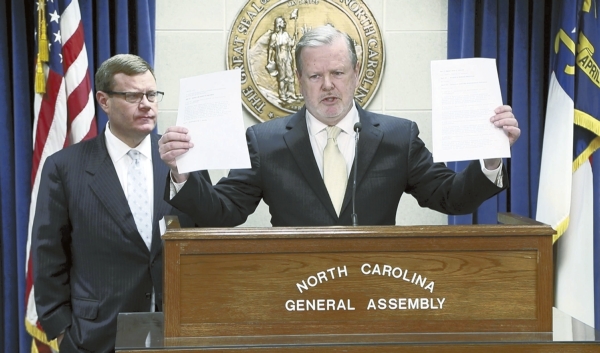John Hood: Will history repeat itself in 2018 election?
Published 12:45 am Thursday, October 11, 2018

- Republican leaders Rep. Tim Moore, left, and Sen. Phil Berger, hold March 2017 press conference. Will Republicans hold on to their veto-proof majorities in the state House and Senate? AP photo
RALEIGH — North Carolina’s 2018 election cycle may be considered a “blue moon” — but Democrats aren’t just standing around without a dream in their hearts. They dream of a sweeping victory this year, and are working hard to try to accomplish it.
Every 12 years, North Carolinians go to the polls in midterms with no statewide races on the ballot other than for the appellate courts. That’s what constitutes a blue-moon election. Lacking a presidential, gubernatorial, or U.S. Senate contest to galvanize public attention across the state, voter turnout tends to be low.
What will happen this year? At least until the tumult of the past two weeks, Democrats have looked confident. They’ve recruited solid candidates in key districts and raised significant funds for them. Most polls have favored them.
So does history. In most modern midterm elections, the party holding the White House have lost congressional and legislative seats. The opposition party’s core voters are usually more motivated to turn out, to vote against policies they dislike and to check the power of the president’s party.
Let’s consider the specific case of the North Carolina General Assembly. In the 12 midterm elections since 1970, the party not controlling the White House has gained an average of 11 seats in the state legislature — an average of eight seats in the N.C. House and three seats in the Senate.
If we zero in on blue-moon elections only, there have been four since 1970. The average legislative swing against the president’s party during blue-moon cycles has been an impressive 17 seats. This is one of those times, however, when the average can be misleading. In three of those cycles, the gains by the opposing party were moderate: +10 Democratic seats in 1970 (with Nixon in the White House), +10 Democratic seats in 1982 (Reagan), and +7 Democratic seats in 2006 (Bush).
The outlier was 1994, the Clinton era, when Republicans gained a whopping 39 seats, clinching the House with a 26-seat gain and nearly winning the Senate with 13. If we go with the median (10) rather than average gain for the out-of-power party, blue-moon elections don’t look much different from midterms as a whole.
Although the anti-White House dynamic will be working against them, Republicans have some advantages of their own. In recent years, at least, GOP-leaning voters — being older and less transient — have tended to vote more reliably during midterm cycles than Democratic-leaning voters have.
Also, congressional and legislative elections don’t happen statewide. They occur within districts. The current electoral maps favor Republican candidates. While Democrats are correct to cite favorable redistricting as an explanation, that’s not the only one. Democratic-leaning voters are disproportionately found in large cities. Even with neutrally drawn maps, running up big majorities in urban districts wouldn’t help them win suburban and rural districts.
Going into the 2018 cycle, Republicans have a 75-45 majority in the N.C. House and a 35-15 edge in the N.C. Senate. That’s more than the required three-fifths vote to override a veto. Democrats are hoping to strengthen Gov. Roy Cooper’s hand by breaking one or both GOP supermajorities.
That would take a four-seat gain in the House and a six-seat gain in the Senate. Based on historical trends, the former is more likely than the latter. As we have seen, a net gain of something like eight Democrats in the House and three in the Senate would be normal. If Republicans manage to keep their General Assembly losses to single digits, that would be comparatively impressive. And if Democratic gains surged into the 20s or higher, that would constitute a catastrophe for the GOP. Its legislative majorities, not just its supermajorities, would be in danger.
I recognize that elections are won race by race. I expect some surprises on Election Day. But with few exceptions, voters in midterms have tended to break against the party in the White House. And in North Carolina legislative races, a loss in the low teens is par for the course.
John Hood is chairman of the John Locke Foundation and appears on “NC SPIN,” broadcast Fridays at 7:30 p.m. and Sundays at 12:30 p.m. on UNC-TV.

